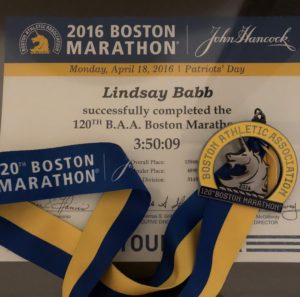“Boston is a state of mind.”
It’s Boston Marathon time. Oh how I love the Boston Marathon. Last year, I had the opportunity to watch it, as I was a few weeks into maternity leave. I know my son didn’t realize how cool it was to see Des Linden bring it home, nor did he get tears in his eyes like his mama did watching her run down Boylston and break the tape. It still was fun to watch with him.
While I won’t be running the Boston Marathon again anytime soon, I know this year’s race will inspire several runners to go for their own BQ this year. Based on my experience qualifying for the Boston Marathon – and failing at it twice first – I thought this would be the perfect time to share a few things I learned through those failures. Here are my tips to run your Boston qualifying race.
Run a Familiar Course
Most people don’t set out to qualify for Boston Marathon on their first 26.2 undertaking. And if you’ve done it, you really don’t need my advice…but I appreciate you reading this so I’ll at least try to make it entertaining. For everyone else, there’s benefit to knowing the course and planning your race strategy appropriately. You can’t predict the weather but at least you can have a heads up on the other environmental factors around you.

Ready to run Boston? I’m here to help.
From the obvious like knowing when hills are going to hit and aid stations are offering gel to the less-thought-of ones like knowing when a relay exchange or popular cheering section is coming up helps to plan for the best experience.
I had run the Fargo Marathon a few times before attempting to BQ. While the course did change a bit each year, I still had the benefit of it being my hometown race, so I knew the roads and I could practice them even during my training.
Eat to Run
I know, I know, we run so we can eat. But we also need to eat so we can run, at our best.
There are foods that fuel performance and, equally important, those that encourage recovery better than others. I’m talking lots of lean protein, leafy greens, vitamins – the obvious stuff. While it may seem obvious, the real trick is actually doing it. It’s easy and tempting to forgo a smart spinach egg-white omelet, sweet potato, and orange for the more appealing half a pizza and candy bar. I mean, you just ran 16 miles. Bring on the carbs and sugar, amIright?
It doesn’t have to mean giving up pizza or other foods you want to eat. Just make a conscious effort to balance it and remember that what you put in is what you get out. Small yet smart changes to my diet played a big role in my BQ. Again, it’s still okay to #treatyoself. I mean, I’m never going to give up Reese’s. Never.
Lift Weights
While runners tend to focus on miles, miles, OMG I need to run more miles, racking up the mileage can lead to burnout and injury, while strengthening the legs makes them, well, stronger.
Achieving a BQ is about more than being faster, it’s also about better overall endurance and creating a body that can withstand step after step pounding pavement without breaking down and fatiguing as badly. It also doesn’t hurt to focus on upper body weight training, too, as a strong back, shoulders, and arms can mean better posture, form, and breathing, all adding up to better run.
I will caution that, as the weekly mileage increases, overall strength can be harder to maintain. I’ve found that I need to accept the fact I have to lower my weights, but still keep up reps. For those looking for ideas, here are a few of my best leg workouts.
Do Speed Work
To BQ, you need to run faster. How are you going to get faster if you don’t try to get faster?
Speed work like various short sprint methods is essential to get the body accustomed to a faster pace as well as build better endurance. The best part about speed work is it doesn’t have to be super intense or done with every run, either – in fact, it shouldn’t be all-out, hard running every run. It can be a gradual build.
I found success with doing it one run a week. Some weeks I’d do my (not) patented Lindsay Intervals. Others it would be a few 60-second sprints sprinkled across my 5-10 mile run. Yes, it’s gotta be done but it can be done at varying levels. Here’s another idea of a running interval workout to get faster.
Push Speed on Long Runs
That important speed work I talked about – while dedicated speed work should be kept to maybe just one weekday run per week, it’s important to push the pace on long runs, too.
In order to maintain a goal pace for a marathon, one has to practice that pace during training. It’s not going to magically happen during race day.
I made this big mistake on attempt #2. I did speed work on my shorter runs during the week but I never pushed it during my long runs. I assumed it was more important to make sure I had the endurance to make it through my long runs and that my adrenaline would perk me up enough to maintain a faster pace come race day.
While my speedwork and adrenaline held up through the first 16 or so miles, it really started to slip away around mile 18 or 19. The heat and humidity didn’t help, but the real problem was I hadn’t practiced sustaining that pace for the long haul.
So, I learned and the following year, I practiced race pace during long runs. This was a key differentiator in missing and achieving the BQ.
Visualize the BQ
I hate myself a little bit for providing this type of fluffy advice. But I swear, there really is something to the power of visualization, seeing yourself in the moment of what you’re trying to achieve, especially towards the end of the race.

My coworkers were pretty pumped for me.
For me, this was big around mile 21. At that point, the BQ was still well within my reach and I was feeling confident. As I continued into miles 22 and beyond, I felt stronger, I didn’t feel like I was starting to bonk and tire out. Part of it was my solid training, but the other part was that I saw myself actually crossing the line in my goal time and it fueled me to keep pushing.
It’s easy to collapse in the last couple of miles of a marathon, where you’re so close yet so far away. No matter how well-trained you are, things happen on race day, especially in those final miles. Visualize the victory and it will help.
Embrace Support
For some, the goal of a BQ might not be that tough to achieve. I think for most though, it is. And it’s tough to achieve any goal in isolation.
There’s a lot others can do to help you achieve a goal, whether it’s mentally cheering you on or picking up your child from daycare so you can squeeze in your speed work run. I was very thankful to have the support of so many people when I prepared for mine, from the simplest, “how’s your training going? You’re going to be great,” to the larger pieces of advice from fellow runners. If you don’t think you have people in your life who will support you, I bet you do – and if nothing else, contact me. I’m here for you!
The other side of support is accountability. Knowing I had so many people who had cheered me on and believe in me throughout my training, and were sending me good vibes on race day really helped push me. And the best part about it? I didn’t have to ask a single person for their support; it all got thrown at me, with enthusiasm. Especially considering it was my third time trying to achieve this goal, that was a really special feeling.
Take Care of Yourself
Pushing for a BQ is going to put a good amount of stress on most, more than training for a marathon with no speed goal in mind. Don’t forget to take extra good care of yourself.
Ice, nap, foam roll, up the water intake, stick massage, sleep more, use rock tape (do it properly it you’re going to use this, don’t just use it for shits and giggles or because you think it looks cool). If you start to feel something sore or tight, take care of it. And good rest is part of good training. I know this one is tough, especially those who have littles.
I admit, even though I listened to my body, I didn’t do a ton of extra care during my BQ training. I did foam roll, drink more water, and take a post-long run Saturday afternoon nap most weeks. That worked for me but don’t skimp; if you feel you need more for yourself, do more for yourself.
Good luck to all you wicked fast runnahs taking on Boston Marathon this year! May your journey from Hopkinton to Boylston be filled with smiles, memories, and feelings of pride. You earned it.
Who else has a good BQ success tip to share? Or do you have a personal question related to your quest for a BQ? The comments are all yours so please leave one, or tweet me @LindsayIRL.
